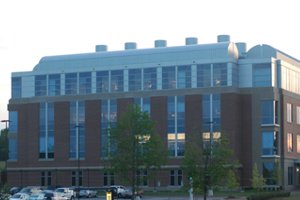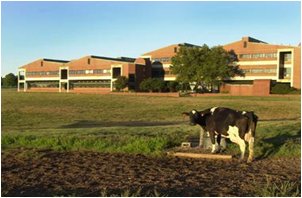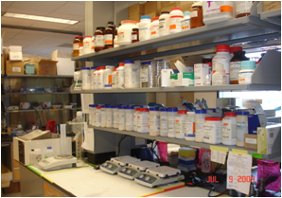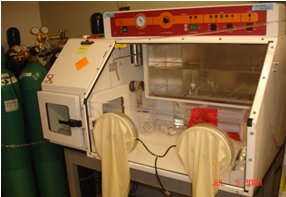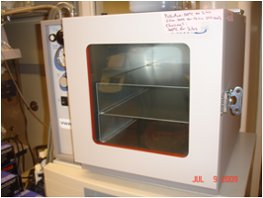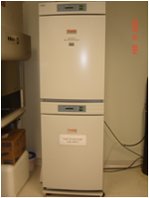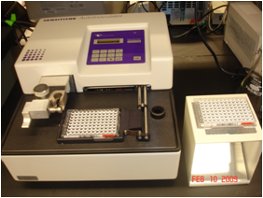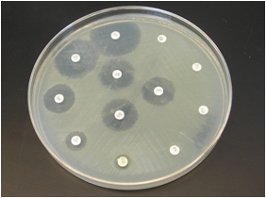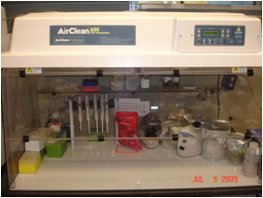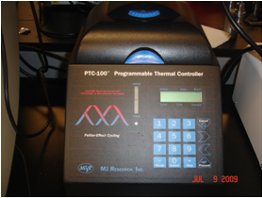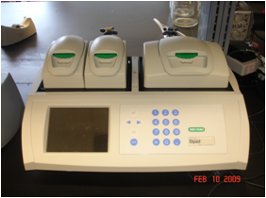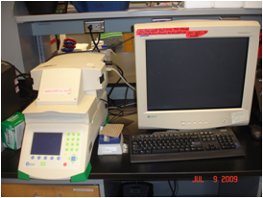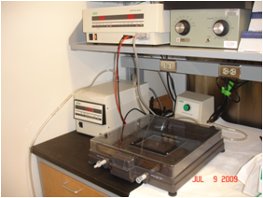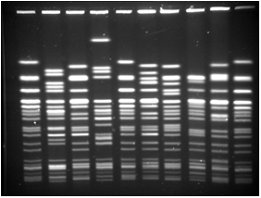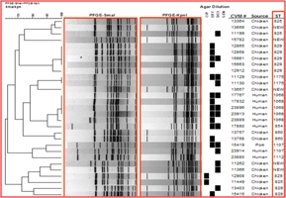Our lab has a space of approximately 500 square feet in the Research building in the College of Veterinary Medicine, NC State University. The lab is equipped with necessary equipment to carry out the phenotypic and genotypic characterization of bacterial food borne pathogens. Our lab is well equipped to conduct on-farm and slaughter sampling followed by pathogen isolation and characterization. In addition, we have a dedicated laboratory space of approximately 400 square feet for processing field samples to isolate bacterial food borne pathogens.
Our lab is well equipped to isolate a variety of bacterial pathogens that require specialized incubation conditions including microaerophillic (Campylobacter) and anaerobic (Clostridium) pathogens. We have two microaerophillic incubators (Forma Scientific) for isolating Campylobacter species from field samples. The Bactron III anaerobic chamber allows for the isolation and incubation for anaerobes all within an oxygen-free environment. This incubator has the capacity to hold up to 300 plates and its gloveless arm design with large oval entry points allow comfort for the user inside the chamber.
We routinely perform antimicrobial susceptibility testing of bacterial pathogens utilizing different methods including Kirby-Bauer disk diffusion test (Salmonella), Epsilometric test (Clostridium) and Sensititre broth microdilution method (Campylobacter and Salmonella). Microbroth dilution is the standard for antimicrobial susceptibility testing. Sensititre provides 96 well plates that contain antimicrobials with different concentrations and can be customized to fit your need. Our lab has the TREK autoinoculator that dispenses the appropriate volume into the sample plate. Additionally, it has a built in nephlometer that will standardize your sample to 0.5 McFarland to increase efficiency, precision, and accuracy.
A major focus of our lab is to develop diagnostic methods for the rapid and sensitive detection of bacterial pathogens. In addition, we routinely characterize the antimicrobial resistant bacterial strains for the resistance determinants. The experiment set up for the PCR reactions are done in the Airclean 600 PCR workstation with HEPA filter. We are equipped with standard PCR theromocyclers (MJ Research and Biorad Tetrad) and real time PCR equipment (Biorad iCycler IQ real-time) to perform the necessary reactions. The Bio-PCR detection system can multiplex up to four target sequences, and is capable of identifying target quantities through nine orders of magnitude. It can be used to detect expressed RNA as well as DNA, and is useful for diagnostics and research.
Our lab is equipped with the CHEF DR III mapper (Biorad) for performing Pulsed filed gel electrophoresis (PFGE) of Salmonella, Campylobacter and Clostridium based on the standardized CDC recommended protocols. In addition, we also perform Amplified length polymorphism (AFLP) utilizing the LI-COR sequencer (LI-COR Biosciences) and the Beckman CEQ 8000 series (Beckman-Coulter). All the genotyping data analysis is done using the Bionumerics Software version 4.0 (Applied Maths).
Our lab is equipped with an Illumina MiSeq. It is a Next Generation Sequencing machine that performs Sequence by Synthesis reactions and base pair detection on a flow cell. The primary use of this MiSeq in the Thakur lab is to perform whole genome sequencing of food-borne pathogen genomic DNA for submission to the FDA Genometrakr program for bacterial outbreak surveillance. Other future uses of the MiSeq include 16S Metagenomics and RNA-Seq to supplement the research goals of the lab.
